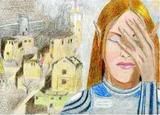|
Kaltia, you should know that the Suffrage Movement had been going on strong just before WWI, and that showed that attitudes toward womens' roles were changing. Also, when men left to go into the armed services, jobs opened that could only be filled by women. This was aggravated by the gearing up of arms, food, and clothing factories to fill the government orders. Heck, I could do a ten page paper on all of that.
This is from The World Book Encyclopedia
World War I: Consequences of the war
World War I seriously disrupted economies. Some businesses shut down after workers left for military service. Other firms shifted to the production of war materials. To direct production toward the war effort, governments took greater control over the economy than ever before. Most people wanted a return to private enterprise after the war. But some people expected government to continue to solve economic problems.
The countries of Europe had poured their resources into World War I, and they came out of the war exhausted. France, for example, had lost nearly one-tenth of its work force. In most European countries, many returning soldiers could not find jobs. In addition, Europe lost many of the markets for its exports while producing war goods. The United States and other countries that had played a smaller role in the war emerged with increased economic power.
Social consequences. World War I brought enormous changes in society. The death of so many young men affected France more than other countries. During the 1920's, France's population dropped because of a low birth rate. Millions of people were uprooted by the war. Some fled war-torn areas and later found their houses, farms, or villages destroyed. Others became refugees as a result of changes in governments and national borders, especially in central and eastern Europe.
Many people chose not to resume their old way of life after World War I. Urban areas grew as peasants settled in cities instead of returning to farms. Women filled jobs in offices and factories after men went to war, and they were reluctant to give up their new independence. Many countries granted women the vote after the war.
The distinction between social classes began to blur as a result of World War I, and society became more democratic. The upper classes, which had traditionally governed, lost some of their power and privilege after having led the world into an agonizing war. Men of all classes had faced the same danger and horror in the trenches. Those who had bled and suffered for their country came to demand a say in running it.
Finally, World War I transformed attitudes. Middle- and upper-class Europeans lost the confidence and optimism they had felt before the war. Many people began to question long-held ideas. For example, few Europeans before the war had doubted their right to force European culture on the rest of the world. But the destruction and bloodshed of the war shattered the belief in the superiority of European civilization.
[ 10-12-2002, 02:07 PM: Message edited by: Attalus ]
__________________
Even Heroes sometimes fail...

|